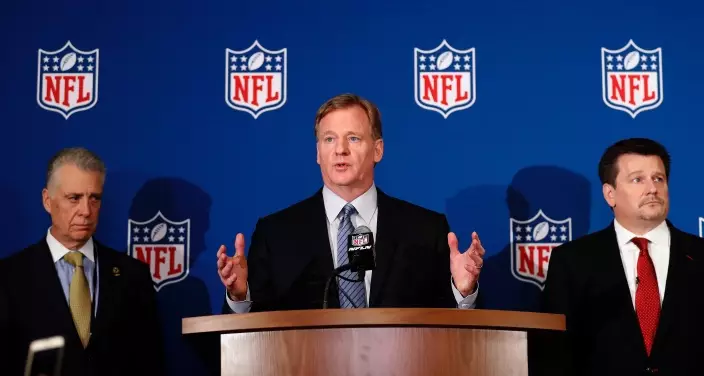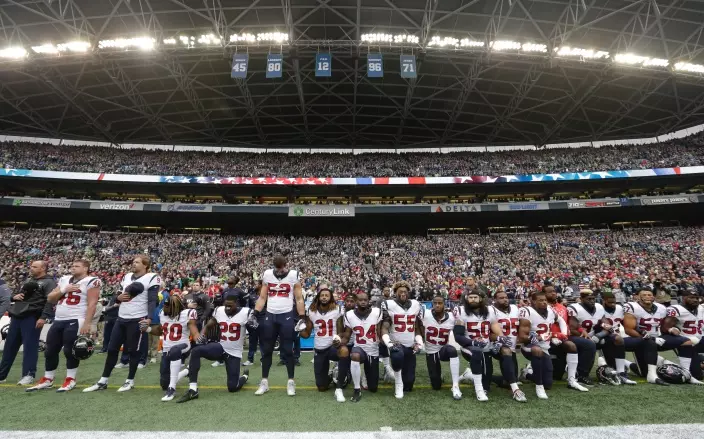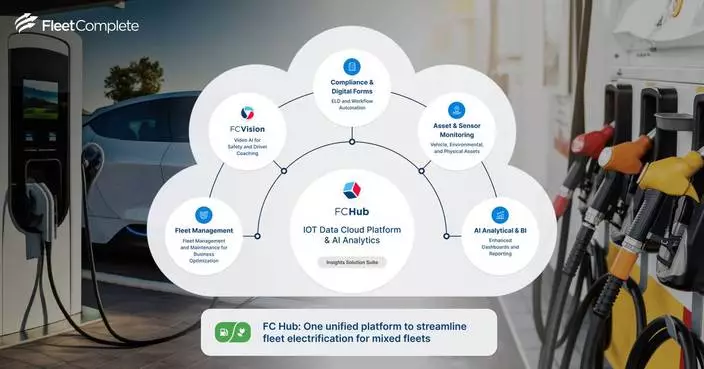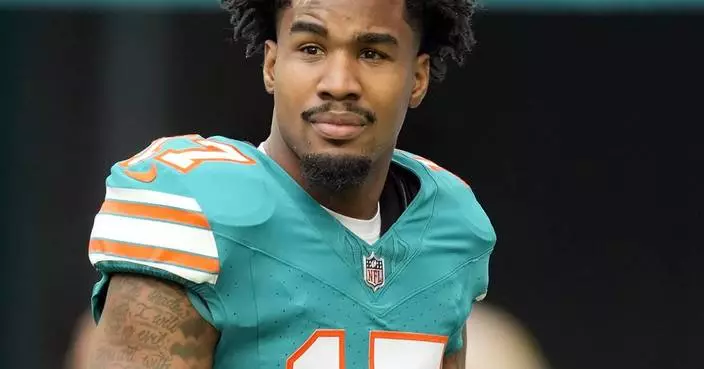With no deadlines to meet and a monthlong summer break coming up, NFL teams are in no hurry to formulate a policy on demonstrations during the national anthem.

NFL commissioner Roger Goodell, center, is flanked by Pittsburgh Steelers president Art Rooney II, left, and Arizona Cardinals owner Michael Bidwill during a news conference where he announced that NFL team owners have reached agreement on a new league policy that requires players to stand for the national anthem or remain in the locker room, during the NFL owner's spring meeting Wednesday, May 23, 2018, in Atlanta. (AP Photo/John Bazemore)
One day after league owners mandated that players must stand for the "Star-Spangled Banner" — they now have the option of remaining in the locker room for the playing of the anthem — few of the 32 teams had done more than preliminary work on the issue.
The NFL gave teams the option of developing their own workplace rules, which many players interpreted as a backhanded way of subjecting them to fines, suspensions or loss of jobs should they carry on with the protests.
For now, other than New York Jets owner Christopher Johnson's decision to pay any fines doled out by the league without passing punishment to the players, each franchise's approach is uncertain.
After all, once mandatory minicamps end in mid-June, teams don't get together again until training camps open in late July. The opening preseason game — the first time the anthem would be played before an NFL match — is Aug. 2 when Baltimore and Chicago face off in the Hall of Fame game.
"I'm sure it's something that will be addressed, by the players and by the coaches, collectively," Lions receiver Golden Tate said Thursday.
"But right now, we don't play a game until August, and that's when it's going to be applicable in football stadiums. So we've got time to kind of brainstorm some ideas on how we could stand for justice and what we can do."
What some teams have done in the past likely indicates how they will handle disciplining players for demonstrations during the anthem — regardless of the intent. Owners Jerry Jones of the Cowboys and Robert McNair of the Texans have been among the staunchest advocates of no exceptions to standing during the anthem.

FILE - In this Oct. 29, 2017, file photo, Houston Texans players kneel and stand during the singing of the national anthem before an NFL football game against the Seattle Seahawks, in Seattle. (AP Photo/Elaine Thompson, File)
Others have taken a less stringent stance, emphasizing working together with the players in their communities rather than focusing on how the message about social injustice is being delivered.
"I have always believed it is the responsibility of sports teams to be very proactive in our communities," says Jeffrey Lurie, owner of the Super Bowl champion Philadelphia Eagles.
"In this great country of ours, there are so many people who are hurting and marginalized, which is why I am proud of our players for continuously working to influence positive change. Their words and actions have demonstrated not only that they have a great deal of respect for our country, but also that they are committed to finding productive ways to fight social injustice, poverty and other societal issues that are important to all of us.
"We must continue to work together in creative and dynamic ways to make our communities stronger and better, with equal opportunities for all."
One certain thing: The uncertainty about how each team will deal with players who defy the NFL's mandate will last for weeks.
Not so for any league personnel such as game officials, sideline crews, et al. They will be disciplined for any violations of the anthem policy, though the exact punishments have not yet been determined by the NFL.
One organization, the National Action Network, will march on league headquarters Friday to "advocate for players' right to kneel and call on NFL owners to reverse (the) dangerous decision violating players' First Amendment rights by imposing fines for not standing during the national anthem."
Such protests could become more prevalent if teams decide to strongly discipline players who demonstrate during the anthem. But some franchises aren't sure they need their own policy. Or if that is even the proper description.
The Falcons' position is any players on the field will stand, so no need to make plans for any other outcome.
Team spokesman Brian Cearns suggested it's too strong to say they have a team policy: "The word policy sounds like it was mandated. It was discussed as a team and agreed upon as a team," Cearns said in an email to The Associated Press.
Defensive linemen Dontari Poe and Grady Jarrett knelt during an early season game at Detroit last year. Coach Dan Quinn said that was a "one-off" and, sure enough, after that game all players stood together on the sideline, with arms interlocked, the remainder of the season.
Buffalo linebacker Lorenzo Alexander doesn't expect his team "to do anything."
"I understand where they're at. And it's hard," Alexander said. "And I understand that from a business perspective trying to be socially responsible. And people can act like it's in a vacuum and say you have to pick a side. But it's not that simple. It's a very complex situation.
"And so I respect them, because I was a business owner and I understand it. It makes a big impact. I'm in this to grow the business, grow their brand, and us doing this does have an impact, whether we say it or not. That's what we want, because we're trying to bring attention to it. But they have to have a foot over here, a foot over here. It's hard."
WASHINGTON (AP) — The U.S. Drug Enforcement Administration is moving toward reclassifying marijuana as a less dangerous drug. The Justice Department proposal would recognize the medical uses of cannabis, but wouldn't legalize it for recreational use.
The proposal would move marijuana from the “Schedule I” group to the less tightly regulated “Schedule III."
So what does that mean, and what are the implications?
Technically, nothing yet. The proposal must be reviewed by the White House Office of Management and Budget, and then undergo a public-comment period and review from an administrative judge, a potentially lengthy process.
Still, the switch is considered “paradigm-shifting, and it’s very exciting,” Vince Sliwoski, a Portland, Oregon-based cannabis and psychedelics attorney who runs well-known legal blogs on those topics, told The Associated Press when the federal Health and Human Services Department recommended the change.
“I can’t emphasize enough how big of news it is,” he said.
It came after President Joe Biden asked both HHS and the attorney general, who oversees the DEA, last year to review how marijuana was classified. Schedule I put it on par, legally, with heroin, LSD, quaaludes and ecstasy, among others.
Biden, a Democrat, supports legalizing medical marijuana for use “where appropriate, consistent with medical and scientific evidence,” White House press secretary Karine Jean-Pierre said Thursday. “That is why it is important for this independent review to go through.”
No. Schedule III drugs — which include ketamine, anabolic steroids and some acetaminophen-codeine combinations — are still controlled substances.
They're subject to various rules that allow for some medical uses, and for federal criminal prosecution of anyone who traffics in the drugs without permission.
No changes are expected to the medical marijuana programs now licensed in 38 states or the legal recreational cannabis markets in 23 states, but it's unlikely they would meet the federal production, record-keeping, prescribing and other requirements for Schedule III drugs.
There haven't been many federal prosecutions for simply possessing marijuana in recent years, even under marijuana’s current Schedule I status, but the reclassification wouldn't have an immediate impact on people already in the criminal justice system.
“Put simple, this move from Schedule I to Schedule III is not getting people out of jail,” said David Culver, senior vice president of public affairs at the U.S. Cannabis Council.
But rescheduling in itself would have some impact, particularly on research and marijuana business taxes.
Because marijuana is on Schedule I, it's been very difficult to conduct authorized clinical studies that involve administering the drug. That has created something of a Catch-22: calls for more research, but barriers to doing it. (Scientists sometimes rely instead on people’s own reports of their marijuana use.)
Schedule III drugs are easier to study, though the reclassification wouldn't immediately reverse all barriers to study.
“It’s going to be really confusing for a long time,” said Ziva Cooper, director of the University of California, Los Angeles Center for Cannabis and Cannabinoids. “When the dust has settled, I don’t know how many years from now, research will be easier.”
Among the unknowns: whether researchers will be able to study marijuana from state-licensed dispensaries and how the federal Food and Drug Administration might oversee that.
Some researchers are optimistic.
“Reducing the schedule to schedule 3 will open up the door for us to be able to conduct research with human subjects with cannabis,” said Susan Ferguson, director of University of Washington’s Addictions, Drug & Alcohol Institute in Seattle.
Under the federal tax code, businesses involved in “trafficking” in marijuana or any other Schedule I or II drug can't deduct rent, payroll or various other expenses that other businesses can write off. (Yes, at least some cannabis businesses, particularly state-licensed ones, do pay taxes to the federal government, despite its prohibition on marijuana.) Industry groups say the tax rate often ends up at 70% or more.
The deduction rule doesn't apply to Schedule III drugs, so the proposed change would cut cannabis companies' taxes substantially.
They say it would treat them like other industries and help them compete against illegal competitors that are frustrating licensees and officials in places such as New York.
“You’re going to make these state-legal programs stronger,” says Adam Goers, of The Cannabist Company, formerly Columbia Care. He co-chairs a coalition of corporate and other players that’s pushing for rescheduling.
It could also mean more cannabis promotion and advertising if those costs could be deducted, according to Beau Kilmer, co-director of the RAND Drug Policy Center.
Rescheduling wouldn't directly affect another marijuana business problem: difficulty accessing banks, particularly for loans, because the federally regulated institutions are wary of the drug's legal status. The industry has been looking instead to a measure called the SAFE Banking Act. It has repeatedly passed the House but stalled in the Senate.
Indeed, there are, including the national anti-legalization group Smart Approaches to Marijuana. President Kevin Sabet, a former Obama administration drug policy official, said the HHS recommendation “flies in the face of science, reeks of politics” and gives a regrettable nod to an industry “desperately looking for legitimacy.”
Some legalization advocates say rescheduling weed is too incremental. They want to keep the focus on removing it completely from the controlled substances list, which doesn't include such items as alcohol or tobacco (they're regulated, but that's not the same).
Paul Armentano, the deputy director of the National Organization for the Reform of Marijuana Laws, said that simply reclassifying marijuana would be “perpetuating the existing divide between state and federal marijuana policies.” Kaliko Castille, a past president of the Minority Cannabis Business Association, said rescheduling just "re-brands prohibition," rather than giving an all-clear to state licensees and putting a definitive close to decades of arrests that disproportionately pulled in people of color.
“Schedule III is going to leave it in this kind of amorphous, mucky middle where people are not going to understand the danger of it still being federally illegal,” he said.
This story has been corrected to show that Kaliko Castille is a past president, not president, of the Minority Cannabis Business Association and that Columbia Care is now The Cannabist Company.

Cloud 9 Cannabis employee Beau McQueen, right, helps a customer, Saturday, April 13, 2024, in Arlington, Wash. The shop is one of the first dispensaries to open under the Washington Liquor and Cannabis Board's social equity program, established in efforts to remedy some of the disproportionate effects marijuana prohibition had on communities of color. (AP Photo/Lindsey Wasson)

Budtender Rey Cruz weighs cannabis for a customer at the Marijuana Paradise on Friday, April 19, 2024, in Portland, Ore. (AP Photo/Jenny Kane)

FILE - Marijuana plants are seen at a secured growing facility in Washington County, N.Y., May 12, 2023. The U.S. Drug Enforcement Administration will move to reclassify marijuana as a less dangerous drug, a historic shift to generations of American drug policy that could have wide ripple effects across the country. (AP Photo/Hans Pennink, File)














